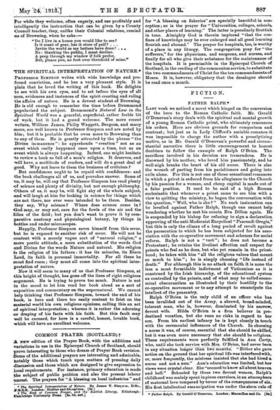THE SPIRITUAL INTERPRETATION OF NATURE.*
PROFESSOR SIMPSON writes with wide knowledge and pro- found conviction, and he has a very pleasant style. It is plain that he loved the writing of this book. He delights -to see with his own eyes, and to set before the eyes of all =men, evidences and instances of the spirit creating and ruling the affairs of nature. He is a devout student of Browning. He is old enough to remember the time before Drummond popularized the subject. Drummond's Natural Law in. the Spiritual World was a graceful, superficial, rather feeble bit of work, but it had a grand welcome. The more recent writers, William James, Philip Waggett, Bergson, and many .more, are well known to Professor Simpson and are noted by him; but it is probable that he owes more to Browning than to any of them. He is greatly attracted by the phrase " the Divine immanence ": he apprehends " creation " not as an event which really happened once upon a time, but as an -event which is always happening. Indeed, one might hesitate to review a book so full of a man's religion. It deserves, and -trill have, a multitude of readers, and' will do a great deal of good. Why not leave to them the business of criticism ?
But confidences ought to be repaid with confidences: and the book challenges all of us, and provokes answer. Some of ors, it may be, will say that Professor Simpson has read plenty of science and plenty of divinity, but not enough philosophy. Others of us, it may be, will fight shy of the whole subject, .and will laugh at him for looking in science for things which are not there, nor ever were intended to be there. Besides, they say, Why science ? Where does science come in ? God may, or may not, care for the fowls of the air and the lilies of the field ; but you don't want to prove it by com- parative anatomy and physiological botany, by things in bottles and under microscopes.
Happily, Professor Simpson saves himself from this error, Int he is exposed to another risk of error. He will not be -content with a merely vague sort of "natural religion," a anere poetic attitude, a mere substitution of the words God And Divine for the words Nature and natural. His religion is the religion of his fathers : it has its miracles, its Risen lord, its faith in personal immortality. For all these he must find room ; they must all come into the spiritual inter- pretation of nature.
Now it will seem to many of us that Professor Simpson, at this height of thought, has gone off the lines of right religious argument. He is trying to prove too much. Nature is not in the mood to let him read her book aloud as a sort of -exposition and commentary on the supernatural. We cannot help thinking that Professor Simpson, toward the end of his hook, is here and there too easily content to foist on the material world his own religions opinions, calling this an act of spiritual interpretation ; whereas it is rather the adorning or draping of his facts with his faith. But this fault may well be excused, for here is a careful, honest, lovable book, which will have an excellent welcome.










































 Previous page
Previous page